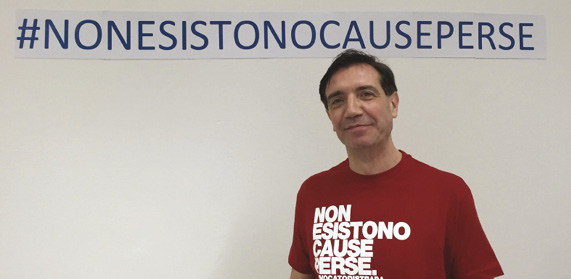The street lawyer is now, in Italy as well, a reference point for defending the rights of the weakest segments of the population. These are first of all the homeless – the “bums” – whose numbers have constantly grown, to the extent that in 2000 attorney Antonio Mumolo founded the “Avvocato di Strada ODV” Association in Bologna. Always committed to volunteer work, Mumolo provides legal support and help to all those who, for the widest variety of reasons, are forced to live in the street, often denied fundamental rights and without any protection. People who might be us, because it takes very little to find oneself without economic, psychological, or emotional support. In 2013, as a result of its constant commitment and work, the Association received the CIVI EUROPAEO PREMIUM from the European Parliament.
How did you get the idea for the Association?
I’m one of the founding partners of the “Amici di Piazza Grande” Association, formed in Bologna to create self-help projects for the homeless. With other volunteers, we went to the streets to offer them a hot tea and especially to talk with them. As soon as they found out I was a lawyer, they always asked me for legal advice. I specialize in labor law, and I often received requests in criminal, administrative, and civil law, so the next day I would call a friend and ask if they could take the case pro bono. I understood that there was a great need to protect the rights of people living in the street, and so I got the idea of “Steet lawyer.”
How is your work performed?
We’re professionals who’ve decided to devote some of our free time to volunteer work. At first there were just two of us, but gradually many volunteers came, so we were able to expand to other cities. We’re now in 60 cities in Italy, opened more than 44,000 cases, and have over a thousand volunteer lawyers. We’ve become Italy’s largest law firm and the one that invoices the least – practically zero.
Compared to other vulnerable segments, why are the homeless deprived of so many rights?
When a person becomes so poor that they can no longer afford to pay rent or a loan, they end up in the street, lose their residence, and are deleted from the city’s registry. In Italy, without residence you become invisible, you can’t work, you lose pension rights, healthcare, voting rights, access to local welfare. We defend individuals, but “Street lawyer” also performs advocacy, i.e., promoting and actively supporting another person’s rights and interests. We do this in a network formed with many other associations.
One of your books is entitled “There are no lost causes.” Hope or reality?
In everyday language and in the collective imagination, a “lost cause” is a problem that’s impossible to resolve or a person who won’t get back on their feet. For us, there are no people who can’t be helped and there are no rulings that can’t be dealt with, even in very complicated situations, because there’s always the possibility of obtaining new decisions.

How can each of us help diminish the problem?
First of all, I’d like to thank you and the reader of your magazine. It’s important to talk about people who have less, to try to change the stereotype of people who become poor, to explain that poverty isn’t a fault, but a condition in which anyone can find themselves. It’s essential to remember that defending the rights of the weak means defending the rights of all of us.




.png)